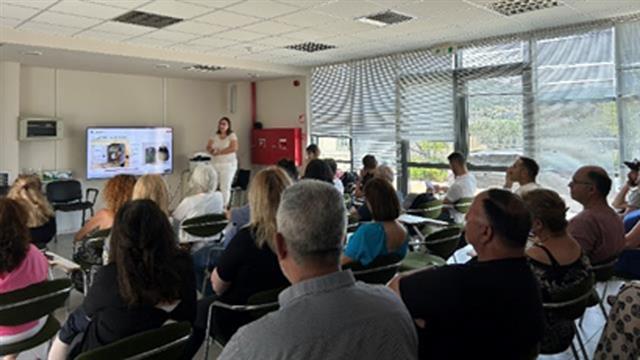30.06.2023 | On 30 June 2023 the Study Tour of the Greek Demo took place, organized by the leader of the Greek Demo, the Hellenic distribution system operator HEDNO.
The participants were invited to the HEDNO Regional Office of Mesogeia. The scope of the event was to reach out a wider audience and communicate the message of Platone and the innovation that the Greek Demo offers to HEDNO. The event was attended by more than 50 employees, with most of them having a non-technical background. The Research and Innovation Division of HEDNO was represented as well. Members of the Greek Demo team from HEDNO and NTUA presented the key outcomes of the Greek Demo:
Stavroula Tzioka, project manager for the Platone Greek Demo (HEDNO) opened the event and made an introductory presentation concerning the Platone project as a whole and the Platone Open Framework as the key outcome of the project. Also, she set the scene for the Greek Demo in specific (objectives, core activities, implementation, etc.).
Effrosyni Maria Gralista (HEDNO) made a brief presentation on the Phasor Measurement Units (PMUs) and more specifically on the technical aspects of the PMUs installation. It was a great opportunity for the Greek Demo to highlight the fact that it is the first time that PMUs are installed for monitoring nodes of the distribution network in Greece.
Themis Xygkis (NTUA) presented the State Estimation Tool, a presentation that drew a lot of attention from the audience, since grid observability is a key enabler for improved distribution network operation.
Finally, Panagiotis Pediaditis, project manager for the purposes of Platone at NTUA, presented the Distribution Use of System Charges (DUoS) tariffs tool, an innovative tool that can design appropriate DUoS tariffs that can effectively trigger flexibility provision. He showed how the tool’s function was validated in the Greek Demo.
The event was very well received by the audience. Special interest was expressed for the PMUs implementation and data handling, as observability at the low voltage level is of great importance in the day-to-day maintenance and monitoring of the grid on a regional level. The discussions continued after the presentations at a working lunch. Members of the Greek Demo team were there to answer further questions of the audience and engage with the participants.
